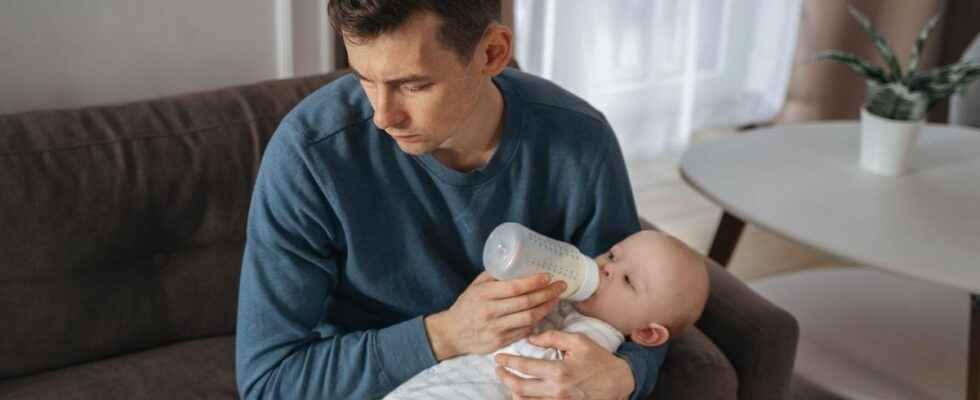Published on
Updated
Reading 3 mins.
in collaboration with
Dr. Joachim Müllner (Psychiatrist)
Medical validation:
06 January 2023
Following a happy event, the risk of depression in young dads is real. However, taking paternity leave seems to reduce the prevalence.
Postpartum depression doesn’t just affect women: fathers are also more at risk of depressive disorders after the birth of a newborn. To prevent this paternal depression, paternity leave seems necessary, according to a recent Inserm study.
5.7% of fathers faced with postpartum depression
If the birth of a child is always a joyful event, the occurrence of depression in one of the parents is quite common during this period. However, depressive disorders in young fathers are still little recognized.
“Postpartum depression in fathers remains little known today, yet studies show that while around 2 in 10 mothers will experience postpartum depression, around 1 in 10 men will also suffer from it.“, relates Joachim Mullner, psychiatrist.
In this context, researchers from Inserm and the Sorbonne University have taken a close interest in this subject.
They based themselves on a sample from the Elfe cohort (18,000 children born in 2011 in France, and their parents) and looked at the effects of paternity leave – over a period of two weeks – and on the prevalence of depression. postpartum in both parents, two months after the birth of the child.
The parents had to answer a questionnaire including a certain number of socioeconomic characteristics (related to employment) and health of the families.
Result ? The study shows that 5.7% of fathers who have not taken this leave develop postpartum depression, while only 4.5% of those who have chosen to take a break have this pathology.
For Dr. Mullner, the results of this study are quite expected as far as fathers are concerned.
“It is quite obvious that not being able to fully enjoy your newborn at such an important time in human life, having to return to work despite the lack of sleep associated with the perinatal period, and not being able to share the parenting is stressful for both parents”.
On the other hand, an opposite trend is observed for mothers: 16.1% of mothers whose spouse took paternity leave had postpartum depression compared to 15.1% of those whose partner intended to take paternity leave. use the leave, and 15.3% of those whose companion had not taken a break.
If these results are more amazing, “they are statistically insignificant here and should therefore not lead to any conclusion other than further research on the subject“, assures the expert.
NO to diets, YES to WW!
“To avoid physiological exhaustion and emotional management skills, it is important to rest as soon as possible. Some advise, for example, to: “sleep as soon as baby sleeps”. This is also why the fairest possible distribution of parental responsibility between the two parents is very important, in order to allow them both to rest, and in particular in couples where the mother is breastfeeding. It is very important, during this period, to have the healthiest lifestyle possible. It is also very helpful to be able to count on those around you to be able to breathe, find yourself as a couple and not be reduced to the sole role of co-parent. It is also very important to be able to speak, verbalize, discuss with his or her partner about his concerns, his doubts“says Dr. Mullner.
Finally, it is finally very important to talk about your suffering to the various professionals encountered during this period “what are for example the PMI, the pediatrician, or the general practitioner to allow them, if necessary, to direct us to a psychologist or a psychiatrist“, concludes the expert.
